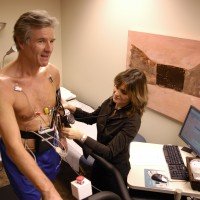Predicting Healthy Futures

Predicting healthy futures: Learn today what your health looks like tomorrow
By: Barbara Balfour
If heart disease and diabetes run in your family, you may be worried about what the future holds for your own health. While it’s always helpful to know your genetic history, it doesn’t tell the complete story of where your biggest health risks might be hiding.
The good news is, you often don’t have to look too far. The strongest indicator of whether you will develop certain health conditions is what you have right in front of you, says Dr. Michael Koehle, a physician and Director of Research at Copeman Healthcare Centre.
“Although family history or genetic testing can indicate an increased risk for certain diseases, this is not where the challenge lies,” he says. “A key element of preventive medicine is the behavioral aspect of care. While it’s relatively straightforward to identify a patient’s increased risk of a particular condition, the real challenge comes with helping them make the lifestyle changes to mitigate that risk.”
At Copeman, comprehensive assessments of each patient, conducted by an entire care team, play a huge role in identifying and managing those health risks.
The physical examination involves the collaboration of a team of physicians, nurse practitioners, registered nurses, registered dietitians, kinesiologists and psychologists. It also includes extensive lab testing, including but not limited to an electrocardiogram, lung function testing, hearing and glaucoma testing, and a comprehensive array of blood and imaging tests.
To determine where their dietary and activity habits could use improvement, patients are also interviewed by a registered dietitian and kinesiologist.
They undergo a customized fitness assessment which looks at factors like their aerobic fitness, biomechanics, flexibility and balance.
After the comprehensive assessment is concluded, the collected data is analyzed to identify health risks and formulate a tailored plan of care.
The patient then reviews the care plan with their physician as frequently as needed in order to get back on track, and stay there.
While serious health conditions don’t develop overnight, it is important to follow up with frequent medical testing, says Copeman family physician Dr. Chris Dawkins.
“If your tests come back showing that your fasting sugar is elevated, meaning that the body cannot bring it back to proper levels even after a 10-hour fast, you know that you are at serious risk of developing not only diabetes but also heart disease,” he says
Such tests are part of the extensive toolkit Copeman uses to evaluate future health issues. Results from tests for fasting sugars, cholesterol levels, and blood pressure monitoring over a 24-hour period can be plugged into a risk calculator to calculate an individual’s specific percentage risks for developing various diseases.
Other tools available to patients include genetic counseling, now available through Copeman’s recent partnership with Medisys.
For more information, call 1-855-364-1336.

